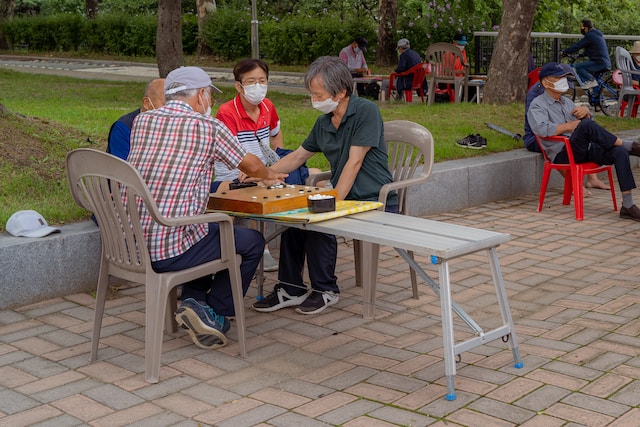As the years go by, we face the reality of our parents aging, and the role of caregiver reverses from them to you. Or, you may have the responsibility of becoming a caregiver for a relative.
Either way, there will come a time when our parents will need the same love, patience, and guidance from us that they gave us throughout our lives. We become the caregivers, and it’s truly a privilege for us to do this for them.
Although caring for aging parents can be challenging, it can also be a deeply rewarding journey. In order to ensure that your loved ones receive the best care and support, it’s crucial to have a well-structured checklist in place.
In this article, we’ll discuss the fundamental aspects of a guide covering essential aspects such as health, legal matters, safety, and emotional well-being.
(Feel free to print this article and cross things off as you accomplish them!)

Step 1: Assess Health and Medical Needs
Before anything else, it’s essential to assess your aging parent(s) health and medical needs. One of the first things you need to schedule is routine health checkups for your parents.
Routine health check-ups are the cornerstone of senior healthcare. Regular visits to your parent’s primary care physician or geriatric specialist can help monitor their overall well-being.
These visits often include:
- Blood pressure and heart rate checks.
- Vision and hearing assessments.
- Bone density scans for osteoporosis risk.
- Immunizations to prevent infections.
- Medication reviews to ensure safety and efficacy.
Your parent’s doctor can also give you an overview of your parent’s health and let you know of treatment they may require in the near and far future.
Step 2: Make a Plan to Manage Medication and Prescriptions
Medication management becomes increasingly critical as your parents age. Create a system to ensure they are taking their prescribed medications correctly.
Here’s what to consider:
- Organize medications in a pill dispenser.
- Set up a medication schedule with alarms or reminders.
- Keep an up-to-date list of all medications, including dosages and instructions.
- Regularly review medications with their healthcare provider to minimize potential side effects or interactions.
Step 3: Address Chronic Health Conditions
Many aging parents have chronic health conditions like diabetes, hypertension, or arthritis. It’s essential to manage these conditions effectively:
- Ensure your parent follows their prescribed treatment plan.
- Monitor blood sugar levels, blood pressure, or other relevant indicators.
- Collaborate with their healthcare team to adjust treatment as needed.
- Encourage a healthy lifestyle with a balanced diet and regular exercise.

Step 4: Make a Plan for Proper Nutrition and Hydration
Good nutrition and hydration are vital for maintaining health and preventing age-related complications.
You’ll want to do all of the following:
- Plan well-balanced meals rich in vitamins and minerals.
- Address any dietary restrictions or food allergies.
- Encourage adequate water intake, especially in hot weather.
Need more information? Take a look at our article Hydration for Seniors.

Step 5: Hone in on Financial Planning and Legal Documentation
This is a large and very important step, so we have broken it up into smaller categories.
5.1 Establish a Power of Attorney
A power of attorney is a legal document that grants someone the authority to make financial decisions on behalf of another person, in this case, your aging parent.
Here’s how to go about it:
- Consult with an attorney to draft a power of attorney document.
- Designate a trustworthy person, often a family member, as the attorney-in-fact.
- Ensure your parent understands the implications of this document.
5.2 Create a Will and Testament
A will and testament is a legal document that outlines your parent’s wishes regarding the distribution of their assets and property after their passing.
To ensure their wishes are honored:
- Consult with an attorney to draft or update their will.
- Discuss asset distribution and guardianship of minor dependents, if applicable.
- Keep the will in a secure place and inform relevant family members of its existence.
5.3 Manage Daily Expenses and Budget Effectively
Financial planning isn’t just about estate planning; it also involves managing day-to-day expenses:
- Create a budget that includes all your parent’s income and expenses.
- Set up automatic bill payments to avoid missed payments.
- Consider using financial management tools or apps to track expenses.
5.4 Explore Government Assistance Programs and Benefits
Many seniors are eligible for government assistance programs and benefits that can ease financial burdens:
- Investigate programs like Social Security, Medicare, and Medicaid.
- Look into veteran benefits if your parent served in the military.
- Seek guidance from a financial advisor or a local Area Agency on Aging.
Need more help? Check out our article Resources for Caring for Aging Parents

Step 6: Check Home Safety and Accessibility
Making your parent’s living environment safe and accessible is crucial for their well-being and independence:
6.1 Adapt the Home for Accessibility
Evaluate the home for potential hazards and make necessary modifications to improve safety and accessibility:
- Install handrails and grab bars in key areas like the bathroom and stairways.
- Ensure proper lighting in all areas of the house.
- Remove tripping hazards like loose rugs or cluttered walkways.
6.2 Create a Disaster Preparedness Plan
Being prepared for emergencies is essential, especially for seniors:
- Establish evacuation routes and emergency meeting points.
- Prepare an emergency kit with essential supplies.
- Ensure your parent knows how to contact emergency services.
6.3 Regularly Inspect the Home for Potential Hazards
A proactive approach to safety is crucial. Conduct regular inspections to identify and address potential hazards:
- Check smoke detectors and replace batteries as needed.
- Examine appliances and electrical systems for signs of wear or damage.
- Consider a home safety assessment by a professional.

Step 7: Plan Emotional and Social Support
Emotional well-being is just as important as physical health. Encouraging your parents to participate in social activities can help them remain connected and counteract any feelings of loneliness.
You can help your parents with their emotional health by doing the following:
- Encourage your parent to participate in community events, clubs, or classes.
- Arrange visits with friends and family.
- Explore senior centers or programs in your area.
7.1 Monitor and Address Signs of Depression or Anxiety
Aging can bring about mental health challenges. Be attentive to changes in mood or behavior:
- Look for signs of depression, such as persistent sadness, loss of interest, or changes in sleep patterns.
- Address anxiety symptoms like excessive worry or restlessness.
- Seek professional help from a therapist or counselor if needed.
7.2 Foster Open Communication Within the Family
Effective communication within the family can prevent misunderstandings and promote emotional support:
- Have regular family meetings to discuss caregiving responsibilities and concerns.
- Listen actively to your parent’s wishes and concerns.
- Respect your parent’s autonomy and involve them in decision-making.
7.3 Seek Professional Support When Needed
Sometimes, emotional or mental health issues may require professional intervention:
- Consult a geriatric psychiatrist or psychologist for specialized care.
- Explore support groups for caregivers and their aging parents.
- Be proactive in seeking help if you notice persistent emotional struggles.

Step 8: Evaluate Long-Term Care Options
While you may want to care for your parents in your home, we know it isn’t always possible, especially if you still have young children. Exploring different long-term care options tailored to your parent’s needs can be to their benefit and may be better for your family in the long term.
Assisted living facilities provide a level of care and support between independent living and nursing homes:
- Visit potential facilities to assess their quality of care and amenities.
- Review the contract and fee structure thoroughly.
- Discuss your parent’s preferences and needs with staff and residents.
Plus, nursing homes offer skilled nursing care for those with more complex medical needs:
- Research nursing homes in your area and read reviews.
- Evaluate the level of care provided, including medical services and rehabilitation.
- Take into account the location and visitation policies.
8.1 Explore In-Home Care and Its Benefits
Oftentimes, depending on the health and mobility of your parents, in-home care can be a good option for parents to age in place while receiving the necessary assistance they need.
If you have decided to let your parents age in place, you’ll want to do the following:
- Hire a reputable home care agency that offers qualified caregivers.
- Create a customized care plan that suits your parent’s needs.
- Regularly evaluate the quality of care provided.
8.2 Evaluate the Pros and Cons of Each Option
Every long-term care option has its advantages and disadvantages:
- Consider your parent’s health, preferences, and financial situation when making a decision.
- Consult with healthcare professionals and family members to make an informed choice.
- Be open to adjusting the care plan as your parent’s needs change over time.

Step 9: Prepare Self-Care for Caregivers
Just as important as taking care of your parents, it’s just as crucial for you to take care of yourself. If you are not physically and mentally well, it will be difficult for you to provide effective care to your parents.
You’ll want to look for the following as you care for your aging parent:
- Recognize the Signs of Caregiver Burnout: This is a real concern and can impact your ability to care for your loved one.
- Be aware of symptoms such as fatigue, irritability, and social withdrawal.
- Seek help if you feel overwhelmed or exhausted.
- Take regular breaks to recharge.
9.1 Prioritize Self-Care for a Healthier Caregiving Journey
Taking care of your own physical and emotional well-being is not selfish; it’s necessary for effective caregiving:
- Eat a balanced diet, exercise regularly, and get enough sleep.
- Engage in hobbies and activities you enjoy.
- Practice stress management techniques like meditation or deep breathing.
9.2 Build a Support Network
Remember, this time in your life can be overwhelming. But you can make it a bit easier knowing that you don’t have to go through this journey alone.
- Reach out to friends and family for emotional support.
- Consider joining a caregiver support group or online community.
- Explore respite care options to give yourself a break when needed.
9.3 Seek Respite Care When Necessary
Sometimes, respite care allows you to take a temporary break from caregiving responsibilities:
- Arrange for a trusted family member or friend to step in as a caregiver.
- Look into respite care services provided by local agencies or senior centers.
- Use this time to rest, recharge, and tend to your own needs.
Final Thoughts: Your Journey Ahead
Caring for aging parents is a truly complex journey. By referencing this comprehensive checklist, you can ensure that your loved ones receive the best care possible. Remember, you are not alone in this journey, and there are resources and support available to help you every step of the way.
In caring for our aging parents, we show them the love, respect, and appreciation they deserve.
As you navigate this path, always keep in mind that your parent’s well-being and your own are equally important. Take one step at a time, seek assistance when needed, and cherish the moments you share with your aging loved ones. Your dedication and love make all the difference in their lives.
It’s a journey that can strengthen bonds and create lasting memories. So, embrace it with open arms, and may your caregiving journey be filled with compassion and fulfillment.
Still struggling to comprehend taking care of your parents in your home? Check out our 10 Tips for Caring for Elderly Parents in Your Home.


















